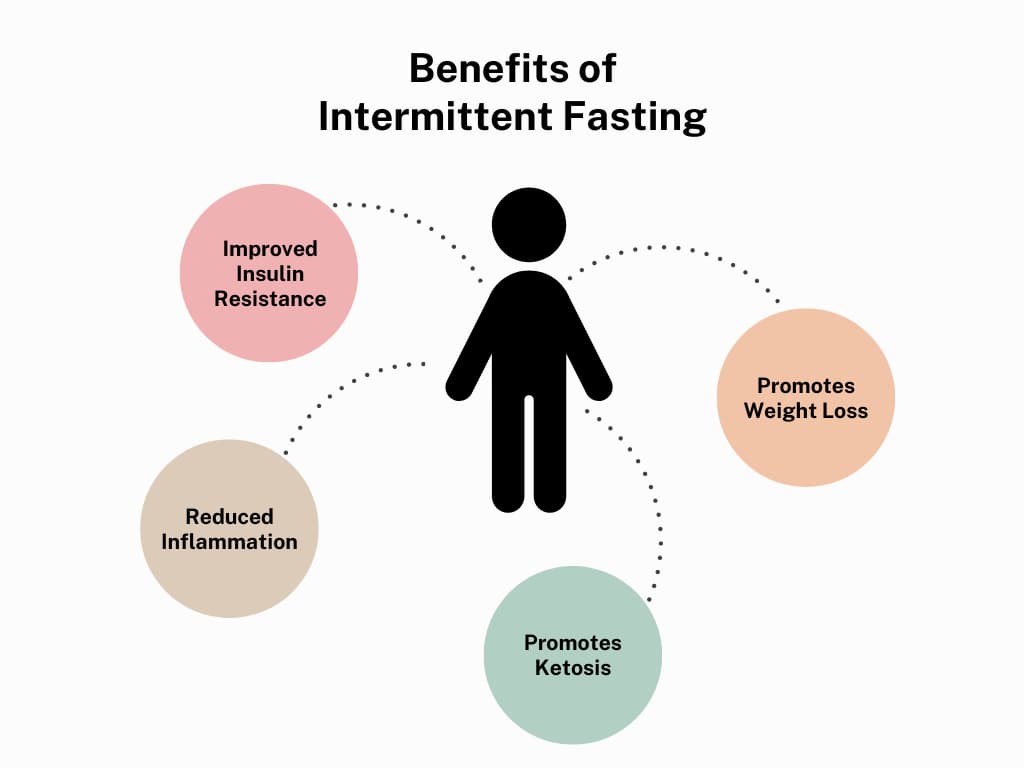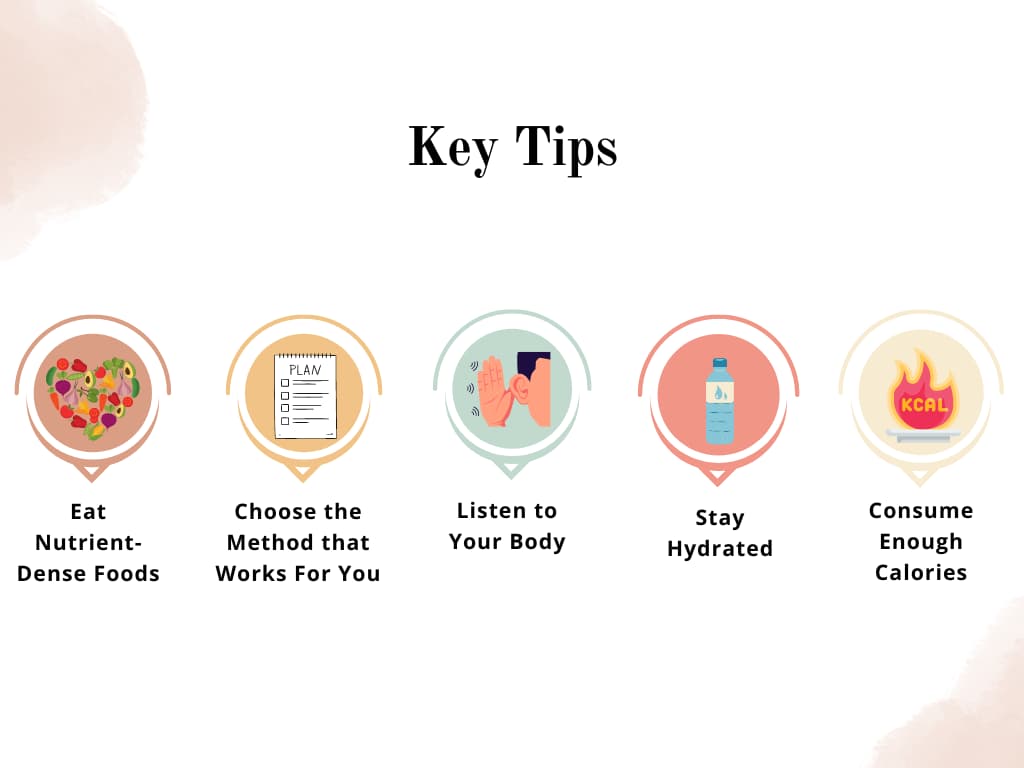Intermittent Fasting for Women Over 50
“Intermittent Fasting for Women Over 50” was written by Balbina Herrera & edited/reviewed by Aly Bouzek, MS, RDN. Balbina is a dietetic intern at Larkin University.
It is important to consult a healthcare professional before starting any new diet or eating pattern, and intermittent fasting is no exception.
What is Intermittent Fasting?
Intermittent fasting has gained popularity in recent years. It is an eating pattern that involves alternating periods of fasting (not eating or drinking) with eating on a regular schedule.
It’s important to note that intermittent fasting may not be suitable for everyone.
Fasting Lengths
There are several different methods of intermittent fasting, but the most common include:
- 16/8 Method: This involves fasting for 16 hours and eating within an 8-hour window. For example, a person might skip breakfast and eat their first meal at noon, then finish eating by 8 pm.
- 5:2 Method: This involves eating normally for 5 days of the week and reducing calorie intake to 500–600 calories for the other 2 days of the week. For example, eating normally during the week and reducing your calories on the weekend.
- Alternate Day Fasting: This involves alternating between days of regular eating and days of fasting, where calorie intake is either very low or no calories are consumed at all.
- Eat-Stop-Eat Method: This involves fasting for 24 hours once or twice a week.
- Time-restricted Fasting: This involves fasting 8–12 hours a day (usually at night) and eating breakfast right when you wake up in the morning.
How Intermittent Fasting Works
In intermittent fasting, during periods of eating, the body takes in energy in the form of calories from the food consumed. These calories are then used to fuel your body’s activities.
During periods of fasting (aka not eating or drinking), your body uses stored energy in the forms of glucose and fat, to meet its energy needs.
Intermittent Fasting for Women Over 50 and Hormones
As women age, their hormone levels naturally fluctuate and decrease, especially during and after menopause. Menopause typically occurs around age 50, although it can happen earlier or later for some women.
Before adding an intermittent fasting method to your routine, it is crucial to speak to a health care professional to determine the appropriate method for you.
Fasting might not be the best fit for everyone, and there are varying needs based on age.
As women age, they undergo menopause. These changes start playing with one’s metabolic health as menopause can cause changes in your body that interfere with body weight, glucose, and insulin.
It is also important to note that fasting can interfere with the intake of medications.
As a result, fasting can help improve insulin sensitivity as well as decrease fat and blood pressure, amongst other benefits.
Menopause
Menopause occurs after your periods stop for an entire year. During menopause, the body’s production of estrogen and progesterone (steroid hormones that help regulate female reproduction development) decreases.
This hormone change can lead to an increase in body fat and a decrease in lean muscle mass. Additionally, changes in hormones can affect appetite and metabolism, making it easier to gain weight and making it harder to lose it.
Women over age 50 who are experiencing symptoms of menopause or other hormonal imbalances should speak with their healthcare provider to discuss their options for managing their symptoms and improving their overall health.
Benefits of Intermittent Fasting for Women Over 50
There are several benefits to intermittent fasting, including but not limited to the following:
- Improves insulin resistance
- Reduces inflammation
- Promotes ketosis
- Promotes weight loss
Let’s learn more about each of these benefits below.
Improves Insulin Resistance
Intermittent fasting can help improve insulin sensitivity, which can aid in weight loss, help lower blood sugar levels, and reduce the risk of diabetes. (1)
When you eat throughout the entire day, insulin is working the entire day. When you have too much insulin, your cells will begin to resist it. Your body counteracts this resistance by making even more insulin.
Improving insulin resistance starts with decreasing the amount of insulin your body makes – this is where intermittent fasting can help.
Scheduling your eating times during the day (not before bed) can help your body get used to producing insulin for part of the day instead of its entirety.
Reduces Inflammation
Inflammation is associated with neurodegenerative diseases such as Alzheimer’s disease, Parkinson’s disease, multiple sclerosis, etc. Reducing inflammation in the body may help to treat these diseases.
Some studies show that intermittent fasting helps reduce inflammation in the body. And as such, may be a future treatment option for those with chronic, progressive disorders (though more studies are needed). (2)
Promotes Ketosis
Intermittent fasting can promote ketosis by depleting the body’s stored glycogen, the primary source of energy for the body.
The body begins to use fat as energy and produces ketones, which can lead to the state of ketosis. In ketosis, the body relies on fat and ketones for energy rather than glucose from carbohydrates.
Promotes Weight loss
Many diets have you focusing on what foods you can or cannot eat. Intermittent fasting focuses on when you eat. This is a great start in promoting weight loss because it may seem easier to maintain than eliminating specific foods or food groups.
Intermittent fasting may help with weight loss by reducing overall caloric intake and by increasing metabolism. This can be especially beneficial for women over 50 who may be experiencing age-related weight gain.

Key Tips for Intermittent Fasting for Women Over 50
If you’re interested in adapting to intermittent fasting, it’s important to approach it in a healthy way to maximize potential benefits and to minimize risks.
Below are tips that can guide you healthfully through your intermittent fasting journey.
Eat Nutrient-dense Foods
Selecting nutrient-dense foods is an important part of maintaining a healthy and balanced diet. These foods provide a high amount of vitamins and minerals, as well as other beneficial nutrients.
Some tips for selecting nutrient-dense foods include:
- Choosing whole foods
- Prioritizing plant-based foods
- Incorporating variety
- Avoiding processed foods
Choose a Method That Works for You
Choosing the appropriate fasting method can depend on several factors, including personal goals, lifestyle, preferences, etc. Consider the following and speak to your healthcare provider before adopting any method:
- Goals
- Health status
- Lifestyle
- Hunger tolerance
Listen to Your Body
It is important to listen to your body at all times, but it is crucial when fasting. Everybody’s body is unique, and your body’s response is different from someone else’s. It is important to pay attention to your body’s signals to ensure you are taking care of your health.
If you are interested in intermittent fasting for women over 50, then take note of some conditions in which your doctor may advise you not to follow this diet’s protocol (3):
- If you are weak
- If you have an eating disorder or have had one in the past
- If you are immunodeficient
- If you have dementia
Additionally, if you are utilizing intermittent fasting, then be aware of these potential side effects:
- Weakness, fatigue, feeling faint
- Nausea, headaches
- Extreme hunger
If you are experiencing any of these effects, then intermittent fasting (or the method/protocol you are following) may not be the right choice for your body.
Stay Hydrated
Fasting can lead to dehydration, especially if not consuming enough fluids during long periods. It is important to drink enough water and other fluids throughout the day to prevent dehydration.
Stay on top of your hydration by monitoring the color of your urine. You should aim for a very pale yellow color. Dark (think apple juice) urine may signal that you are already dehydrated.
Consume Enough Calories
Malnutrition is a concern with intermittent fasting. If you do not replenish your body with enough calories after a long fast, then you are missing out on necessary nutrients and calories.
Energy levels can be affected, which is why it’s important to adjust fasting practices accordingly and consume nutrient and energy-dense foods to maintain health.

Potential Risks
While intermittent fasting may have potential health benefits, there are also potential risks if it is not done properly.
Some potential risks of intermittent fasting include:
Nutrient Deficiencies
If a person does not consume enough nutrients during the eating period, then they can experience nutrient deficiencies.
It is important to make sure that you are still consuming enough nutrients during eating periods to support your overall health and well-being.
Disordered Eating
People who are prone to disordered eating should be careful with intermittent fasting, as it may trigger unhealthy behaviors. It can lead to obsessive thoughts about food, binge eating episodes, or feelings of guilt.
Low Blood Sugar
Fasting can cause a drop in blood sugar levels, which can be dangerous for those who have diabetes. Symptoms of hypoglycemia (or low blood sugar) include dizziness, weakness, sweating, shakiness, and fatigue.

Potential Risks for Intermittent Fasting for Women Over 50
While there is some evidence that intermittent fasting can be beneficial for health, it is important to note that it can also carry risks, particularly for older adults.
Some potential risks for older adults include but are not limited to:
- Malnutrition
- Medication interaction
- Blood sugar control
Older adults should consult with their healthcare provider before starting an intermittent fasting regimen. Risks depend on numerous factors such as overall health status, medication use, nutritional needs, medical history, amongst others.
Conclusion: Intermittent Fasting for Women Over 50
It is important to approach intermittent fasting with a balanced and sustainable mindset.
Intermittent fasting should not be used as an excuse to overeat or indulge in unhealthy foods during eating periods, as this can negate potential health (and weight loss) benefits.
Remember, intermittent fasting is not for everyone. Speak to a professional to assess whether this method is appropriate for you, and to develop a plan that will be beneficial for your health.
